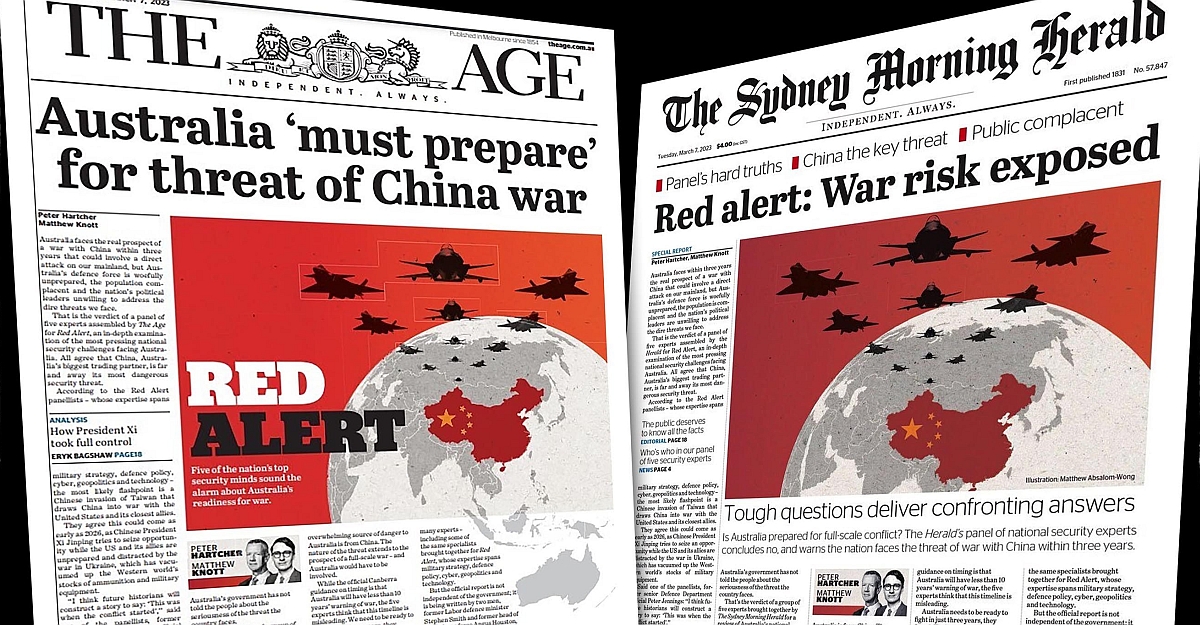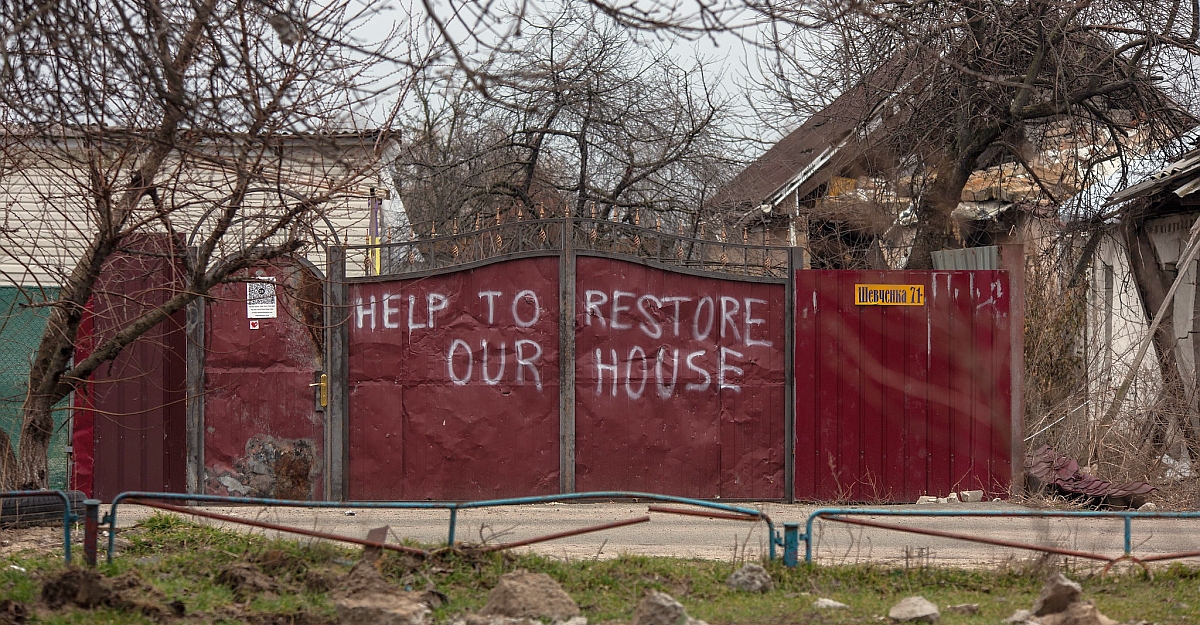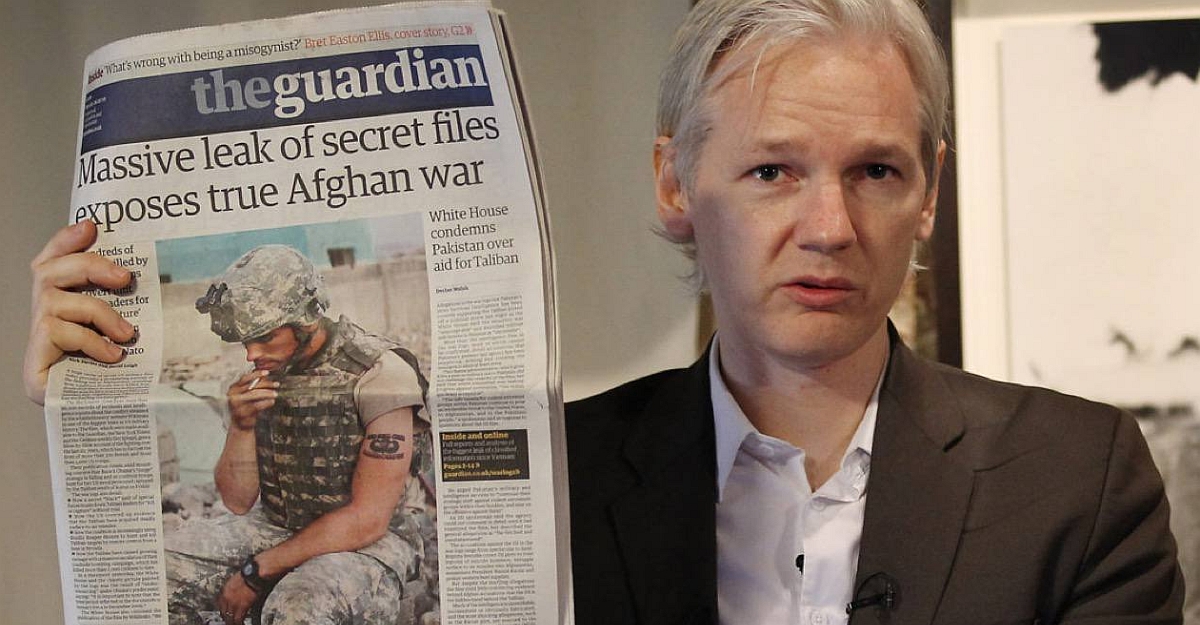On last Sunday’s edition of ABC’s Insiders, guest Peter Hartcher offered this caution as his ‘final observation’:
This week has been the 20th anniversary of the start of the Iraq war. At this moment of high celebration with the Australia-US alliance, I think that anniversary should be a sobering reminder for us to apply independent, prudent judgment to any US decision about war in the future.
Shrewd words—though not ones you’d think would have emerged from Hartcher’s mouth just days after the Sydney Morning Herald and the Age, newspapers at which Hartcher is International Editor, ran one of the most unrestrained series of warmongering commentaries in recent memory.
Badged ‘Red Alert’, the series of three pieces authored by a panel of ‘national security experts’ made the alarming claim that Australia faces the prospect of war with China in as little as three years. On day two of the series, readers were met with this frightening prevision:
Within 72 hours of a conflict breaking out over Taiwan, Chinese missile bombardments and devastating cyberattacks on Australia would begin. For the first time since World War II, the mainland would be under attack.
As if this suggestion wasn’t grotesque enough, the series proposed compulsory military service and the hosting of American nukes on Australian soil as ‘confronting ideas’ the nation should nevertheless consider.
In response to criticisms of the hysterical tone and content of the ‘Red Alert’ stories, Hartcher defended the series as a catalyst for debate. This seems a little like attempting to start a conversation about child labour laws by arguing that all fourteen-year-olds should work in salt mines for two years. In reality, there was no debate. The five commentators (China hawks all-round, as Laura Tingle pointed out to Hartcher’s obvious annoyance on Insiders) were in furious agreement as to the existential and imminent risk posed by China. Not one contrary view was offered, nor anything to balance the inclusion of Peter Jennings, a senior fellow at the Australian Strategic Policy Institute—a think tank partly funded by a group of defence contractors including Lockheed Martin, BAE, and Raytheon—who has been laughably wrong about China’s regional military ambitions before.
Tales of mainland Australia’s invasion by China are nothing new in the Sinophobic imaginary of settler colonialist culture.
The first ‘invasion novel’, by journalist and Labour Movement activist William Lane, appeared in 1888 as a serial in the Boomerang. Since then, as former Chair of Australian Studies at Peking University, David Walker, has noted, ‘similar tales of invasion have become regular best-sellers … [with] over fifty Australian novels dealing with Asian invasion, very often invasion from China.’ As recently as 2019, Heather Rose’s novel Bruny imagined a quasi-authoritarian Tasmania in which the political order has been upended by Chinese ‘chequebook colonialism.’
In his 2015 Orwell Prize oration on the pacifist writer Thomas Merton, Rowan Williams observed that ‘it is not really that war happens when reasoned argument breaks down; it is more that “reason” has been used in such a way that it subtly and inevitably moves us towards war.’ In tone, Hartcher is a commentator of high seriousness, his utterances usually inflected with self-conscious gravitas. No doubt, hawkish though he may be, he really thinks of the ‘Red Alert’ series as a rational intervention in a debate we have to have on a militarised conflict with China. In substance, it was simply another entry in Australia’s thick book of red scares, complete with comic-style graphic art of warplanes streaming out of China.
It also reminded me—like much of the Australian media’s borderline fetishistic reaction to the AUKUS submarine deal—of the classic Day Today sketch in which a news anchor slowly goads a British minister and the Australian Foreign Secretary into declaring war over a benign trade accord. In an instant, the TV studio is plunged into a red-hued hive of activity with pumping music, a prosaic story of everyday government business transformed into a delirium of live crosses, embedded journalists, and footage from ‘nose-mounted smart bomb cameras.’ As if out of nowhere, giant red letters spelling out ‘WAR’ materialise on set. The sketch is a brilliant and enduring piece of satire on the mainstream media’s uncritical amplification of pro-war narratives, which another Insiders regular, Mark Kenny, recently characterised in light of the subs deal as ‘selling the policy and policing the public debate.’
If Hartcher is concerned Australia might repeat the folly it made in joining the invasion of Iraq twenty years ago, he should be mortified by the prospect of war with China. As Hugh White noted in the Conversation, such a war would not only be the biggest since World War II, but possibly the ‘worst ever’, given the high probability of the use of nuclear weapons. It shouldn’t need spelling out that Australia could not win a war with China in any sense that matters, even with the backing of the US and its allies. At best, such a victory would be a Pyrrhic one. At worst, we would be so utterly humiliated as to not even know what kind of defeat had been inflicted upon us.
The writer’s task in times like ours is not to augment the voices which insist that war is inevitable, but to direct our collective attention towards what we risk by failing to challenge this assertion. We need only look to Iraq, a war in part enabled by a craven media establishment which to this day remains in denial about its part in facilitating the invasion, to do this. For as long as we accept the fundamental absurdity of going to war with our largest trading partner—and preparing for it at a cost that could lift over two million Australians out of poverty, with more than enough money left over to fully electrify every Australian household—we will be joining a conga line to Armageddon.
In an unpublished preface to Animal Farm, George Orwell remarked that totalitarianism isn’t really necessary for the censorship of certain ideas to take root. All that needs to happen for the ‘gramophone mind’—what he would later come to term ‘groupthink’—to emerge is ‘the kind of censorship that the English literary intelligentsia voluntarily impose upon themselves.’ Far from a provocation to further discussion, ‘Red Alert’ is in reality a classic of Orwellian self-censorship, homogeneously asserting a single, narrow viewpoint, and making the case for the government’s subs in the process.
So, too, in its way, was Sunday’s Insiders itself an illustration of Orwell’s point. The program felt it necessary to platform not one but two China hawks—the other was the Australian’s foreign editor Greg Sheridan, a man who seems never to have met a war he doesn’t like—alongside host David Speers’ limp questioning of Defence Minister Richard Marles. Speers could have raised the very real prospect that the subs promised by the AUKUS agreement will never eventuate or that, if they do, they’ll only enjoy about a decade of service before becoming easily detectable, and thus destroyable, by China. As is customary, he pursued entirely trivial ‘gotchas’ instead.
Meanwhile, as the Australian media serves up lashings of warmed-over invasion fantasy, the real existential crisis we face continues to quietly unfold. This week, the United Nations released what will most likely be its final comprehensive climate assessment while it is still possible for the world to remain below 1.5°C of warming. In the kind of quiveringly understated language necessitated by transnational compromise, the ‘synthesis report’ warned: ‘There is a rapidly closing window of opportunity to secure a liveable and sustainable future for all.’ In other words, we’ve almost run out of time to avert climate catastrophe. There will, presumably, be no headline series on this news in Australia’s most-read newspapers, nor a multi-billion dollar investment by the Government to head off this most profound of threats. One difference, as the UN report reminded us, is that the war against climate change is still—if only just—one we can actually win.



